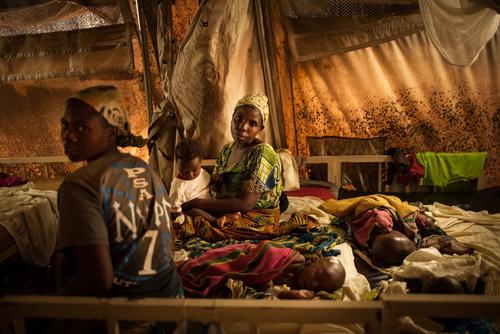From late November 2014 to early February 2015, Dr. Brice Daverton worked with MSF in the general hospital of Rutshuru in the North Kivu province, Democratic Republic of Congo (DRC). Dr Daverton explained how our medical teams treat children, the principal victims of an unprecedented malaria epidemic
“There were children everywhere, often three to a bed. We had an average of two hundred inpatients at any given time, mostly really little children not even five years old. Some were brothers and sisters.
In November and December, there were over 700 admissions a week and bed occupancy was close to 300%. Our Congolese colleagues had never seen anything like it. They told us it was the worst outbreak they’d ever confronted, as much in terms of seriousness as in the number of cases and the time it lasted, which is why I wanted to help the teams working there.
And I’d never seen anything like it either, certainly not during my previous assignment for MSF in Paoua in Central African Republic (CAR) and even less in France*. Every day we ‘lost’ patients. That’s something we aren’t used to and it’s not what we signed up for when we went into medicine or humanitarian aid. Health workers find it really tough. It was something I’d never encountered in Europe, it hardly ever happens here, whereas sad to say, it was an everyday occurrence in Rutshuru...
It was all the more harrowing because we had to deal with pathologies that made treating very acute cases even more difficult. There were so many respiratory infections and severe septic conditions. Children suffering from malnutrition were looked after in a dedicated unit as protein deficiencies weaken the organisms and immune systems of under five-year olds, making them the most vulnerable patients.
When their conditions allowed, children suffering from ‘uncomplicated’ malaria were treated orally with artemether derivatives while intravenous artesunate was used for the more acute cases. We would treat the weakest children and those who had seizures or were suffering from severe dehydration with rehydration therapy and, when necessary, antibiotics. We were fortunate enough to have access to a range of effective treatments.
There were four Congolese doctors working in the pediatric unit and two in the emergency room. With the most serious cases, you have to move fast and there’s neither the time nor the resources for loads of medical tests. It’s the clinical examination that counts in the field, which is very different to how it’s done in France. In fact, my work in RDC may well influence the way I treat my patients here.
There was a little boy who was seriously ill and his case really touched me. He was eight years old. When he arrived at the hospital, he was having seizures and he was in respiratory distress so we put him in intensive care straight away. Three days later, I saw him in the pediatric unit where he was recovering. I will never forget his little grin and his mother’s smile as she said, “He’s fine doctor, he’s cured.” It makes us so happy when we see that what we do does actually make a difference.
In addition to managing this unprecedented malaria epidemic, MSF also runs the crisis unit at Rutshuru general hospital: surgery, intensive care, emergency treatment, and providing care to victims of sexual violence and burn patients. At the end of 2014, almost 450 patients were being admitted every day to the hospital, which ordinarily has only 287 beds. We had to put up tents in the courtyard to cope with the influx of patients. The principal challenge now facing the medical team is to relieve the pressure on the hospital. Images from my two months in Rutshuru will stay in my mind for a very long time—the pediatric unit crammed with beds, bed nets and intravenous equipment. I’ll never forget the noise either. With all the shouting and crying, it sounded a bit like a beehive. It was actually quite scary, especially during the night-shift, even if I have to admit that you do get used to it.”




